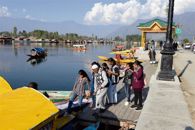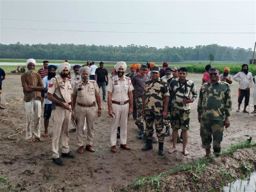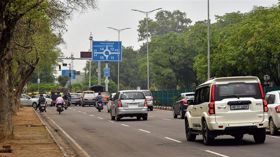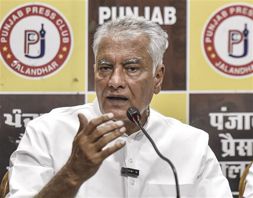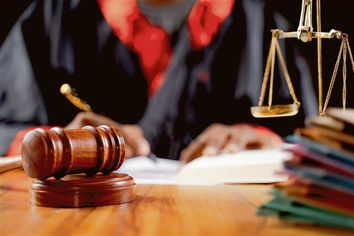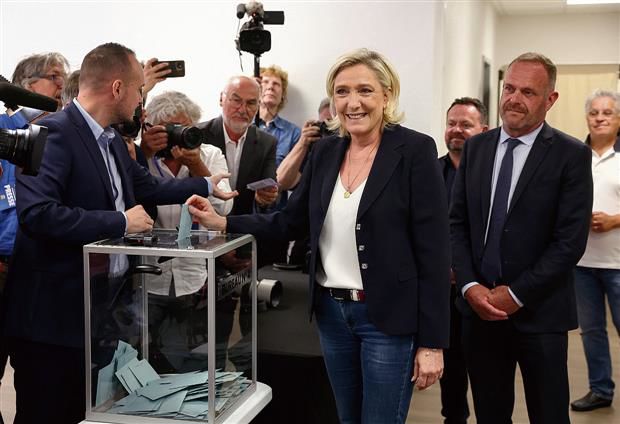
Marine Le Pen, French far-right leader, casts her ballot at a polling station in Henin-Beaumont, France, on Sunday. REUTERS
Paris, June 30
Voters across mainland France cast ballots on Sunday in the first round of early parliamentary elections that could put the government in the hands of nationalist, far-right parties for the first time since the Nazi era.
The two-round elections that wrap up on July 7 could impact European financial markets, Western support for Ukraine and the management of France's nuclear arsenal and global military force.
Many French voters are frustrated about inflation and other economic concerns, as well as President Emmanuel Macron's leadership, seen as arrogant and out-of-touch with their lives. Marine Le Pen's anti-immigration National Rally party has tapped that discontent, notably via online platforms like TikTok, and led in preelection opinion polls.
A new coalition on the left, the New Popular Front, also poses a challenge to the pro-business Macron and his centrist alliance Together for the Republic. It includes the French Socialists and Communists, the greens and the hard-left France Unbowed party and vows to reverse an unpopular pension reform law that raised the retirement age to 64, among other economic reforms.
Turnout stood at an unusually high 59 per cent with three hours to go before polls close. That's 20 percentage points higher than turnout at the same time in the last first-round vote in 2022.
Some pollsters suggested the high turnout could temper the outcome for the hard right National Rally, possibly indicating voters made an extra effort to cast ballots for fear that it could win.
The vote was taking place during the traditional first week of summer vacation in France, and absentee ballot requests were at least five times higher than in 2022.
The first polling projections were expected at 8 pm (1800 GMT), when final polling stations close. Early official results were expected later Sunday.
Macron voted in Le Touquet, a seaside resort in northern France. Le Pen also voted in the north, her party's stronghold, but in the working-class town of Hennin-Beaumont. Voters in Paris had issues from immigration to the rising cost of living on their minds as the country has grown more divided between the far right and far left blocs, with a deeply unpopular and weakened president in the political centre. The campaign was marred by rising hate speech.
"People don't like what has been happening," said Cynthia Justine, 44. "People feel they've lost a lot in recent years. People are angry. I am angry." She added that with "the rising hate speech," it was necessary to express frustrations with those holding and seeking power.
She said it was important as a woman to vote since women haven't always had that right. And "because I am a Black woman, it's even more important. A lot is at stake on this day."
Macron called the early elections after his party was trounced in the European Parliament election earlier in June by the National Rally, which has historic ties to racism and antisemitism and is hostile toward France's Muslim community. It also has historical ties to Russia.
Macron's call was an audacious gamble that French voters who were complacent about the European election would be jolted into turning out for moderate forces in national elections to keep the far right out of power. — AP
Two-round snap parliamentary poll
HOW DOES VOTE WORK
France has 49 million registered voters. There are 577 constituency contests, one for each seat in the National Assembly, the lower house of parliament. Candidates with an absolute majority of votes in their constituency are elected in the first round. In most cases no candidate meets this criteria and a second round is held. To qualify for the run-off, candidates need first-round votes amounting to at least 12.5% of registered voters. The top scorer wins the second round.
WHO WILL RUN GOVT?

The president names the prime minister, usually from the party with most seats. For the first time in France’s post-war history, the far right could win, opinion polls show, with a left-wing union seen winning the second-biggest group and President Emmanuel Macron’s centrist alliance coming third. An absolute majority requires at least 289 seats.
WHAT HAPPENS NEXT
France has had three periods of “cohabitation,” where the government is of a different political stripe from the president, in its post-war history. The government has most of the power on the domestic front, but the president is the head of the military and wields influence abroad. However, the division of power on foreign policy is not clear cut and that could be an issue for France’s stance on the war in Ukraine or European Union policy. REUTERS
Join Whatsapp Channel of The Tribune for latest updates.












